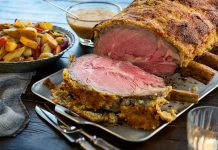Did you know April 27th is Prime Rib Day? While many of us enjoy both pork and beef ribs who knew it was going to be a special day?
Of course, there are many ways to prepare ribs – any food enthusiast can easily find several hundred recipes online. Here is one of the best recipes for Prime Rib, provided by “Meathead Goldwyn” of Amazing Ribs.
Every year on April 27th the biggest demonstration of skills in preparing and consuming this popular dish is celebrated in the United States. It is Prime Rib Day.
Little is known about the genesis of Prime Rib Day.
The popularity of this event probably began several hundred years ago. Prime Ribs were initially known, depending on the context, as Standing Roast, Christmas Roast or Sunday Roast, but it has always been a dish for special occasions.
The name Standing Roast comes from the method of preparation of the dish: the ribs remain on the bone, during roasting, which ensures the stability of the whole element and does not allow the meat to come into direct contact with the hot metal, thus preserving its juiciness.
Sunday Roast comes from an English Sunday meal where beef was served with Yorkshire pudding, mashed potatoes, horseradish or mustard. The whole family would gather around the dish after going to church. Numerous sources claim that the popularity of this dish started in the late Middle Ages.
The English royal guards are still sometimes called “Beefeaters” – the name appeared as early as in the 15th century when the custom of eating roast beef became popular among the guards. The tradition of the Sunday Roast still prevails today.
The way this dish is prepared means that the ribs can be placed in the oven before going for a Sunday walk or to church so that you can come back to a practically ready meal. This Sunday meal has been chosen by the British people as the second most important part of British culture, even ahead of the British monarchy, and Big Ben.
The name Christmas Roast refers to a festive culinary tradition Christmas ribs can be served with seasonal extras such as mushrooms. With the expansion of the British Empire, the tradition of this meal became popular in Ireland, South Africa, Australia, New Zealand and above all in Canada and the United States.
This period of expansion coincided with the agrarian revolution when increasing agricultural productivity in the United Kingdom allowed people to see meat on their tables more often. It was also connected to the development of processing – as butchers’ qualifications developed, new methods were created for producing pieces of a different culinary value from carcasses.
Roasted ribs have not only a long historical tradition as a dish but above all a significant culinary value. Prime Ribs do not have to be made of U.S. Prime quality ribs but can be prepared using any grade ribs. The ribs must be cut from one piece so that they form a single whole. It is important that the piece has at least two ribs to keep it juicy during the roasting process. It is worth adjusting the size of the purchased ribs to the number of served portions – it is recommended that one protruding rib should make two portions. The dish can also be prepared after removing the bones, but then it may lose a lot of taste – in such a case, remember to shorten the roasting time by 30 minutes.
It is not very difficult to prepare this dish if you have good quality beef. First of all – it’s best if the beef is dry seasoned – in the case of EU beef, there is a chance that the transport process itself has already made it tender. Once the beef has been taken out of the fridge, it should be coated with the right sauce – it could be butter with salt, pepper, garlic, thyme and rosemary. Ribs must be cooked at a higher temperature, e.g. 425°F for 20 minutes, so that the pores in the meat close to keep the juices in, then roast them at a lower temperature, e.g. 325°F. The roasting time at the lower temperature depends on the weight of the roasted meat – it can be assumed that each pound requires 15 minutes of cooking. For example – three ribs may require 1.5 hours, while 6 ribs require as much as 3 hours of roasting.
Of course, those who prefer rawer or even blue beef can reduce the roasting temperature. After taking the dish out of the oven, leave it to rest for 20 minutes. You can use that time to prepare Yorkshire pudding, which traditionally accompanies the dish.
Beef from meat breeds imported from the European Union is well suited for making this dish.
The use of these breeds means not only going back to the roots, as the recipe for this dish was developed using the meat of these animals, but it also guarantees high culinary quality. Large pieces of meat, the right marbling and the peace of mind in knowing that the cattle grew slowly, without any growth hormones, make European beef suitable for preparing tasty, juicy ribs for Prime Rib Day.


